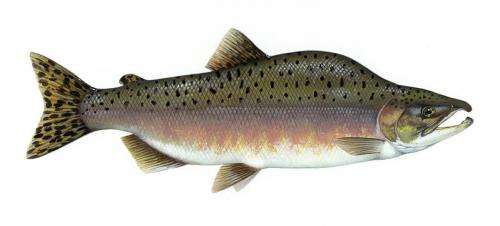Salmon genome sequenced

Today the International Cooperation to Sequence the Atlantic Salmon Genome (ICSASG) announced completion of a fully mapped and openly accessible salmon genome. This reference genome will provide crucial information to fish managers to improve the production and sustainability of aquaculture operations, and address challenges around conservation of wild stocks, preservation of at-risk fish populations and environmental sustainability. This breakthrough was announced at the International Conference on Integrative Salmonid Biology (ICISB) being held in Vancouver this week.
Salmonids are an important piece of the economic and social fabric of communities on BC's coastline and many other countries including Norway and Chile. The fisheries and aquaculture sector is one of the economic engines of BC: seafood is the province's largest agri-food export, contributing $870 million of the province's total agri-food exports of $2.5 billion. High value species such as salmon make a significant economic contribution to the economy. Canada's Atlantic salmon related aquaculture revenues exceed $600 million annually and BC is the only province with a commercial salmon fishery.
Salmonids are also a key species for research and while some salmon genetic information is known, many fundamental questions have remained: a fully assembled reference sequence available for researchers worldwide will have a major impact on revealing information about salmon and other salmonids, such as rainbow trout and Pacific salmon.
Viruses and pathogens are a challenging hazard to livelihoods and economies dependent on salmon and this sequence provides real support to improve the production of salmonids in a sustainable way. Other benefits of the salmon sequence include applications for food security and traceability and broodstock selection for commercially important traits. Healthier food, more environmentally sound fish farming and better interactions with wild salmon are all positive outcomes from this research.
"Knowledge of the whole genome makes it possible to see how genes interact with each other, and examine the exact gene that governs a certain trait such as resistance against a particular disease," says Dr. Steinar Bergseth, Chair of the International Steering Committee for the ICSASG. "The development of vaccines and targeted treatment is much closer."
The international collaboration involves researchers, funding bodies and industry from Canada, Chile and Norway. The successful completion of the salmon genome provides a basis for continued partnerships between these and other countries involved in research and industrial development of salmonids.
"A better scientific understanding of this species and its genome is a critical step towards improving the growth and management of global fisheries and aquaculture," says Dr. Alan Winter, President & CEO of Genome BC. "Additionally, the level of international collaboration seen in this project is a testament to the importance of global coordination to address challenges too big for any one country individually."
The aquaculture industries need to produce healthy food in a sustainable and efficient manner to be in line with the consumer demands. "The knowledge of the sequence will certainly give us a long awaited tool to achieve this" says Petter Arnesen, Breeding Director of Marine Harvest, Norway.
Provided by Genome BC



















